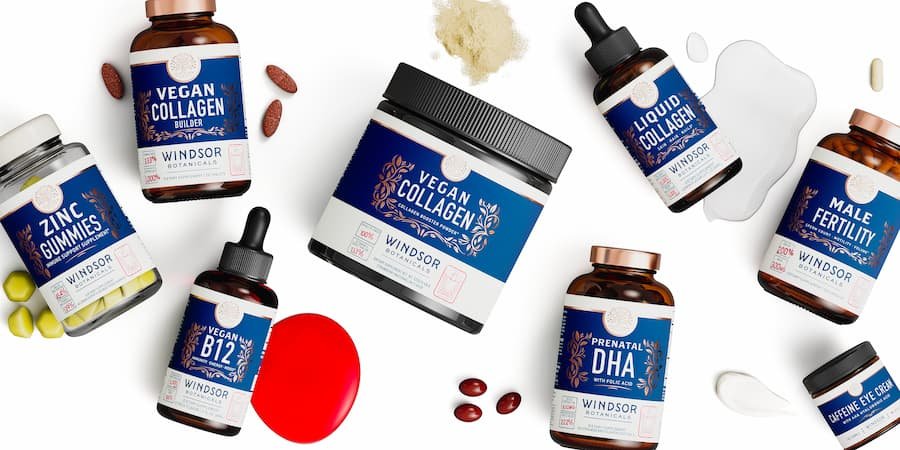Collagen is an often misunderstood entity. If you’ve ever bought a face cream, shampoo, or conditioner you’d be forgiven for thinking it’s something that only comes in a jar or bottle. In fact, collagen is something we’re born with. Something that plays a critical role in our physical maintenance, keeping us flexible, functional, and youthful.
The problem is that as we grow older, the aging process outpaces our body’s ability to produce collagen in the quantity and quality that we need.
So let’s take a look at what collagen is, why it keeps us young, what goes wrong as we age, and finally, what we can do about it. (Spoiler alert – we have options).
Table of Contents
What is Collagen?
Collagen is a fibrous protein, essentially the glue that holds together our bone, skin, muscles, tendons, cartilage, and tendons. At a biological level, it’s strands of amino acids held together in an ultra-strong helix structure. Ninety percent of these amino acids are glycine, proline, and hydroxyproline.

How does collagen keep us young?
When we’re young, collagen is a tightly organized network of fibres that keep our skin and connective tissue taught but flexible. It’s abundant in our bones, muscles, and blood, and makes up 75% of our skin as well as a third of the total protein found in the body.
But it’s not purely structural – it also carries out a role in other functions including tissue repair, immune function, communication between cells, and tissue maintenance.
So younger bodies have fewer wrinkles and general aches and pains. They recover from sickness and muscular injuries quicker and are faster to repair cuts, bumps, and bruises.
Collagen as we age
As we get older, the uniformly ordered construction of collagen starts to become more disjointed and loses its structure and strength. This is most noticeable in wrinkles in the skin but also has an impact on the entire stock of collagen in the body.
It can lead to brittle hair, and nails, gradually weaker bones, and painful joints as cartilage wears down. Mobility and muscle function can be impaired and that in itself can lead to falls that the body is less and less able to repair.
Not only does existing collagen start to deteriorate, but also the amount of new collagen produced in the body slows down. So there’s a double-edged sword of quality and quantity we have to deal with.
This collagen supply and quality issue starts in our twenties and continues as we march into old age.

What can we do?
It’s worth noting that there are lifestyle factors that play a role in looking after the collagen we do have. Excess exposure to UV rays in sunlight does collagen in the body no favors at all. The same goes for drinking too much alcohol, having a sedentary lifestyle, and lacking enough good quality sleep.
So if you do nothing else, stay out of the sun, sleep more, exercise more, don’t smoke, and lay off the booze. But diet and supplements can also be a significant factor.
The good news
The important thing to remember is that collagen is resorbable. That means we can consume it (or even inject it) and the body is able to put it to use. So we do have options when it comes to boosting the collagen in our bodies whether that be by consuming it directly or even by encouraging natural production of it.
The truth is, getting adequate collagen into your diet can often be tough. That’s part of the reason that supplements in other formats like liquid collagen, powders, or tablets are increasing in popularity (particularly if you follow a vegetarian or vegan diet).
Good sources of collagen in the form of glycine, proline, lysine, and hydroxyproline include:
- Dairy, particularly parmesan cheese
- Red meat, chicken, turkey, pork, fish, and eggs.
- Bone broth
- Legumes (including, chickpeas, beans, lentils, soybeans, and peanuts
- Non-genetically modified soy, including tofu
Collagen supplements

When something seems too good to be true then it’s wise to be cautious about it. But the weight of evidence behind collagen supplements is growing at pace. For example, The International Society of Dermatology carried out a review of 19 separate studies including over 1,000 people finding that hydrolyzed collagen consistently improved skin hydration, elasticity, and wrinkles.
Collagen is generally hydrolyzed to break it down into smaller pieces that the body can utilize. It’s often partnered with other ingredients like vitamin C, or biotin which help the body put the collagen to use.
There are vegan collagen booster options available, which don’t contain collagen itself, rather they include other naturals which encourage the body to naturally produce more collagen.
So you have clearly options when it comes to supplements, it’s just a matter of doing your research and finding something that fits for you.
Conclusion
We now know that there are the lifestyle factors (put that cigarette out), exercise (do more of it) that can have a big impact on collagen in our bodies. There are diet tweaks and plenty of options when it comes to supplements.
Sadly, none of us are getting any younger. But with the benefit of a little knowledge, we can all help our bodies to function better and longer, and stay looking good while we’re doing it.
About the author
Adam Jenkins is head of product development for Windsor Botanicals who offer a wide selection of supplements and beauty products inspired by nature. This includes liquid collagen and vegan collagen builder options fortified with collagen bioactive-enhancing vitamins, minerals and naturals.

